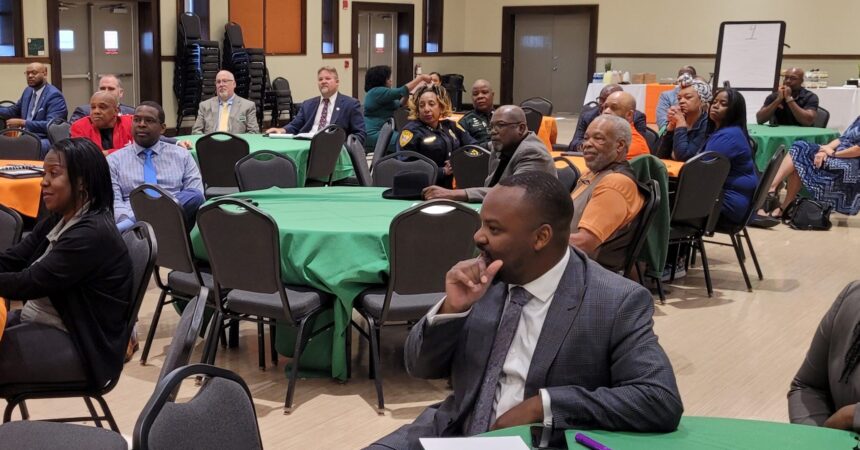
Stakeholders look for crime-fighting solutions

Photo by St. Clair Murraine

Photo by St. Clair Murraine

Photo by St. Clair Murraine
By St. Clair Murraine
Outlook Staff Writer
A chair that for years had been a sure resting place one day collapsed and tripped the person who relied on its durability.
Because the chair was relied on to be a safe seat for so many years, the owner decided to repair it. Even so it took the owner months before sitting again without fear of falling.
That is the analogy that Will Daniels used to make the point of how much work needs to be done to restore public trust in law enforcement.
Trust and legitimacy were just one of the topics tackled during a two-hour crime workshop at FAMU’s Grand Ballroom Tuesday night. The other topics were policy and oversight, training and education, and community police and crime reduction.
Randy Nelson, an associate professor of criminology at Bethune-Cookman, fashioned the roundtable discussions off of former President Barack Obama’s 21st Century Policing Task Force report.
His goal, Nelson said, was to make sure “everybody had a voice at this table and call it what it is.”
He rallied representatives from across the community, including clergy, multiple levels of law enforcement, college students, youth service leaders and mental health professionals. FAMU, Bethune-Cookman and Edward Waters also had representatives at the event.
The lineup of representation was ideal for starting a conversation that had potential to find solutions to crime, said Dale Landry, a former military law enforcement officer.
“When you bring the community people together and they have a chance to have dialog as mutually equal; not being done by the sheriff, not being done by the police chief but being done by bringing the community up,” said Landry. “This is very strong about changing communities.”
The conversation to find the right model to bridge the gap between community and law enforcement is a “fundamental start,” Landry added.
“There is a lot we can do; but the thing that needs to happen is we stand up and establish an opportunity for the community to come to the table and help from the bottom up,” he said.
Former Jacksonville Sheriff Nathaniel Glover charged the groups to be proactive during their discussions. Before he concluded he said “You don’t want to be another. You’ve got to be the one.”
Each group was asked to come up with workable solutions, working through various areas of community and policing in an attempt to alleviate rising crime. Each group was given a set time to vote on the top three recommendations from their lists, and explaining how to achieve them.
“What I’m betting on is that the community and those in the criminal justice system see this work as about engaging each other whether you’re Black, White, green or yellow, Republican or Democrat we all deserve a safe place to raise our families,” Nelson said. “I’m betting that this work is going to resonate.”
Seemingly it is, considering that Royle King, director of the Council on the Status of Men and Boys, left feeling that discoveries in the discussions could help the council’s cause.
“This is very important and significant because it’s those steps that a year from now, two years from now that will inform the decisions that we make later and guide that path,” King said.
The Council is an initiative by Leon County Sheriff Walt McNeil, who is using data collected through the agency’s “Anatomy of a Homicide” report to find answers to solving crime.
There might be something to add from the findings that Nelson is pushing for, King said.
“I’m looking forward to all of the information,” he said. “Once it’s put together and ranked, then those continuing conversations and how do we leverage those so that we are all communicating to come up with a strong action plan.”
Recommendations collected from the roundtable conversations are the first phase of dwindling down to workable solutions, Nelson said. At least one more round of meetings this summer will be held before he sieves through the suggestions one last time.
The findings will be shared with all of the participating entities, he said.
Tonja Bryant-Smith, a deputy chief with Tallahassee Police Department, expressed optimism that the findings will be useful.
“Hopefully we will get some good ideas on stuff that we are not doing or things that we can improve on,” she said. “If we hadn’t had a partner at the table before maybe we made a new partner tonight. Hopefully we get some new ideas to keep us rejuvenated to move forward.”







